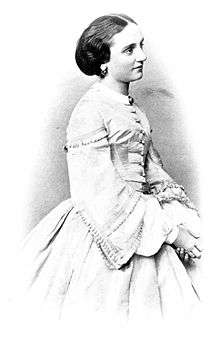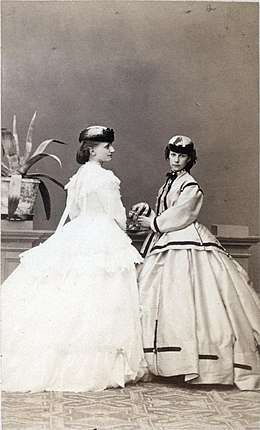Princess Sophie of Saxony
Princess Sophie Maria Friederike Auguste Leopoldine Alexandrine Ernestine Albertine Elisabeth of Saxony, Duchess of Saxony (Full German name: Prinzessin Sophie Maria Friederike Auguste Leopoldine Alexandrine Ernestine Albertine Elisabeth von Sachsen, Herzogin zu Sachsen) (15 March 1845, Dresden, Kingdom of Saxony – 9 March 1867, Munich, Kingdom of Bavaria) was the eighth and youngest child of John of Saxony and his wife Amalie Auguste of Bavaria and a younger sister of Albert of Saxony and George of Saxony. Through her marriage to Duke Karl-Theodor in Bavaria, Sophie was a member of the House of Wittelsbach and a Duchess in Bavaria.
| Princess Sophie of Saxony | |||||
|---|---|---|---|---|---|
| Duchess Sophie in Bavaria | |||||
 | |||||
| Born | 15 March 1845 Dresden, Kingdom of Saxony | ||||
| Died | 9 March 1867 (aged 21) Munich, Kingdom of Bavaria | ||||
| Burial | |||||
| Spouse | Duke Karl-Theodor in Bavaria | ||||
| Issue | Amalie, Duchess of Urach | ||||
| |||||
| House | Wettin | ||||
| Father | John of Saxony | ||||
| Mother | Amalie Auguste of Bavaria | ||||
| Religion | Roman Catholic | ||||
Marriage and issue

Sophie married Duke Karl-Theodor in Bavaria, fifth child and third-eldest son of Duke Maximilian Joseph in Bavaria and his wife Princess Ludovika of Bavaria, on 11 February 1865 in Dresden. Sophie and Karl-Theodor had one child:
- Duchess Amalie in Bavaria (24 December 1865 – 26 May 1912)
Illness and death
Childbirth caused severe respiratory problems for Sophie, which progressively weakened her, although she managed to recover. However, a year later she contracted a severe case of influenza that she could not overcome. Sophie died shortly before her 22nd birthday on 9 March 1867 and was interred at Tegernsee Abbey.
Titles and styles
- 15 March 1845 – 11 February 1865: Her Royal Highness Princess Sophie of Saxony, Duchess of Saxony
- 11 February 1865 – 9 March 1867: Her Royal Highness Duchess Sophie in Bavaria, Princess and Duchess of Saxony
Ancestry
| Ancestors of Princess Sophie of Saxony |
|---|
References
- Erika Bestenreiner. The Empress Sissi. Milan, Mondadori, 2003.